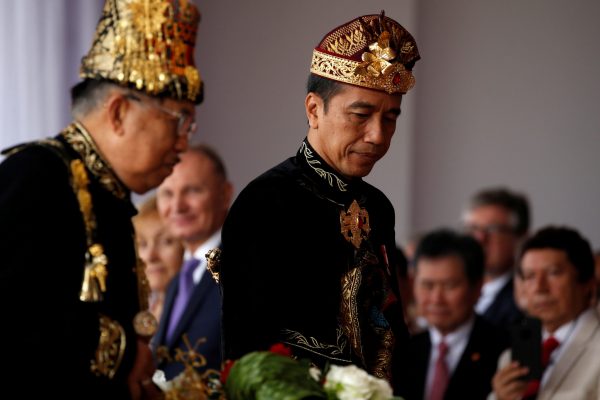Some commentators argue that Widodo is unlikely to suddenly become fascinated by foreign affairs and that there is little chance his administration will produce or allow innovative solutions to the strategic issues haunting the region. Widodo himself has spoken about his unfinished business inside the country, suggesting his foreign policy will stay very much oriented towards domestic needs.
On the other hand, there are those who anticipate change in Widodo’s foreign policy outlook. A two-term limit means he will no longer be burdened by electability or the need to stay in power, which could lead to a somewhat different approach. The extent of Widodo’s attention to foreign policy may also depend on his cabinet composition and advisors he keeps close to him.
Going from Widodo’s recent speeches, campaign promises, and spontaneous answers during the 2019 presidential debates, continuity seems to be the general trend. For Widodo, Indonesia’s national interest is about the protection of national citizens abroad, and the establishment and maintenance of trade and investment relations with other countries. This was shown through statements in support of prioritising economic diplomacy in multilateral institutions such as the G20, as well as through his administration’s attempts to accelerate the finalisation of various comprehensive economic partnership agreements and preferential trade areas.
Widodo’s rhetoric has so far reemphasised and justified foreign policy oriented to domestic needs. His first speech after re-election and state of nation address in August depicted his full attention to developing domestic capacities, economy, governance and social resilience. When he does mention Indonesia’s international affairs, he mostly refers to the tasks of administration, rather than durable solutions to address issues that may only impact in the long term.
The challenge is that domestic agendas cannot be distinctively separated from international dynamics. National economic growth, for instance, is influenced partly by confidence in the stability of the region. Most of the biggest programs being implemented under Widodo’s administration to drive economic growth involve a fair share of international participation. Take Indonesia’s national infrastructure projects, whose huge financing needs depend on foreign direct investment.
Still, there have been some changes in the narratives that Widodo uses to frame foreign policy since the 2014 presidential campaign. For one, Widodo’s vision for Indonesia’s role in the world is no longer dictated by jargon such as the ‘Global Maritime Fulcrum’. Instead, more pragmatism is obvious — he emphasises Indonesia’s capacity for technology and manufacturing more regularly, for example.
Past governments framed Indonesia’s democracy as a vital foundation of its diplomacy and Widodo’s first term drew out Indonesia’s character as a maritime nation. In a departure, the narrative of his 2019 campaign emphasised Indonesia’s Muslim identity. This signifies intentions to deepen relations with Islamic countries, such as through aligning policies with Islamic causes or expanding Indonesia’s presence in the global halal market. But this evolution can also be read as part of Widodo’s pragmatic effort to harmonise domestic preferences with his pursuit of economic development, rather than a strategic manoeuvre to answer global challenges.
Unfortunately, continuity will not be sufficient. The regional and global challenges surrounding Widodo’s second term require him to pay more attention to foreign policy, even though his own priorities and considerations will eventually dictate the kinds of policies being promoted (including first and foremost through his choice of foreign minister). Those challenges include maintaining the unity of ASEAN amid the push-and-pulls of great power economic projects, preventing the rise of great power competition in the South China Sea, promoting adherence to international law, and reintroducing incentives to manage international disputes via peaceful and cooperative mechanisms.
Indonesia needs to be able to navigate, balance and diversify offers of involvement in geopolitically sensitive projects. A lack of creativity and strategic thinking may have already detrimentally influenced the shape of Indonesia’s foreign policy. For example, while Indonesia has done well in actively championing a stable and peaceful Rakhine, most of its policy has come in the form of relief and medication to the humanitarian crisis, rather than leadership in addressing the political aspect of the problem.
The same goes for Indonesia’s promotion of the ASEAN Outlook on the Indo-Pacific (AOIP). While the AOIP is a step forward, Indonesia still has to do the homework of finding the substance of the outlook. The substance lies in the providence of a robust strategy that really deploys the AOIP in practice, to validate Indonesia’s vision on the region, to restrain behavioural patterns based on zero-sum game approaches to foreign policy, and to harmonise competing visions of the Indo-Pacific.
For regional stability to be maintained, Indonesia needs to view these kinds of regional issues as an extension of its own national interest. There should be many more policy options outside those currently being considered. Indonesia foreign policy strategy should go beyond the traditional objective of confidence-building. To give meaning towards the principles of inclusivity and respect towards international law in the AOIP, for instance, Indonesia should discourage any behaviour showing exclusivity and disrespect towards international law. This includes persuading other ASEAN countries to express disinterest towards related policies or projects embodying contradictory values.
To achieve this, Indonesia should boost its presence and cooperation with other ASEAN countries, not only through diplomatic presence, but also in economic, security, and people-to-people interactions. ASEAN centrality needs to be re-earned, not reclaimed.
Widodo’s first term lacked a grand vision of Indonesia’s position in the world implemented through clear, accurate, and robust strategies based on strategic calculation. Neglecting foreign policy in his second term risks harming Indonesia’s capacity to navigate turbulent times. Muddling through is no longer an appropriate strategy.
Shafiah F Muhibat is Head of International Relations at the Centre for Strategic and International Studies (CSIS) Indonesia. M Waffaa Kharisma is Research Assistant at CSIS Indonesia.

